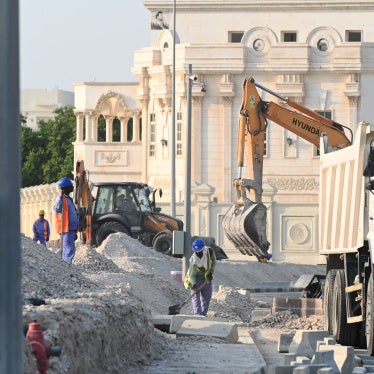(Beirut) – Saudi Arabia’s Council of Ministers broke new ground on August 26, 2013, by passing a draft law criminalizing domestic abuse. The law, however, does not detail specific enforcement mechanisms to ensure prompt investigations of abuse allegations or prosecution of those who commit abuses.
Saudi Arabia’s Social Affairs Ministry should coordinate with the justice, interior, and other relevant ministries in drafting executive or implementing regulations clearly laying out the responsibilities of specific government agencies in implementing and enforcing the law. The new law gives an unspecified “competent” government agency authority to investigate abuse allegations and take steps to ensure the safety of victims of abuse, and it authorizes the agency to refer cases to criminal justice authorities to arrest, prosecute, and convict perpetrators of abuse and remove dependents from an abusive guardian’s care.
“Saudi Arabia has finally banned domestic abuse, but has yet to say which agencies will police the new law,” said Joe Stork, acting Middle East director at Human Rights Watch. “Without effective mechanisms to punish domestic abuse, this law is merely ink on paper.”
Prior to adoption of the Law on Protection from Abuse, Saudi criminal justice authorities had no written legal guidelines to treat domestic abuse as criminal behavior. In the absence of a written penal code, judges rely solely on their individual interpretations of uncodified Sharia law to determine whether certain actions could be considered criminal.
The text of the new law, which Human Rights Watch has reviewed, defines domestic abuse as “all forms of exploitation, or bodily, psychological, or sexual abuse, or threat of it, committed by one person against another, including if [that person] has authority, power, or responsibility, or [if there is a] a family, support, sponsorship, guardianship, or living dependency relationship between the two [individuals].” The law also classifies neglect as domestic abuse.
Under the law, unspecified government agencies have the authority to intervene in cases of domestic abuse, including by ensuring that victims receive adequate health services, taking steps to prevent recurrence of abuse, providing societal and family counseling, summoning and obliging offending parties to sign pledges, and forcing offenders to undergo psychological treatment or rehabilitation programs. In cases “in the which the competent agency determines from an abuse notification that it is a dangerous case, or that it represents a threat to the life, safety, or health of an abuse victim,” the unspecified agency can take additional measures such as referring the case to an administrative authority or security services, which have the authority to make an “emergency intervention or enter a place where abuse has taken place.”
When the unspecified agency determines that abuse rises to the level of criminality it can refer offending parties to criminal justice authorities for arrest and prosecution. However, the law does not make clear how they would determine criminality.
The law sets the penalty for domestic abuse at between one month and one year in prison and/or a fine of between 5,000 ($1333) and 50,000 ($13,330) Saudi Riyals unless Sharia law provides for a harsher sentence. Judges can double the specified penalties for repeat offenders.
On August 28, the Saudi National Society for Human Rights, which is supported by the estate of the late King Fahd, welcomed the new law but noted “the necessity of issuing an executive regulation for the law urgently for its implementation and benefit.”
The law defines abuse as bodily, psychological, or sexual, but does not make explicit that marital rape is a crime, leaving open the possibility of differing interpretations of criminality.The law also does not address institutional systems that grant male family members and employers inordinate power over their female relatives or domestic workers, such as Saudi Arabia’s male guardianship system and unfair worker sponsorship regulations. In many cases, dependents would require logistical support or transportation from male relatives or employers, who themselves often are the abusers, in order to report abuses or escape abusive situations.
As Human Rights Watch has documented in the report “Perpetual Minors,” the male guardianship system and strict gender segregation limit women’s ability to take part in public life. This discriminatory system prevents girls and women from traveling, conducting official business, or undergoing certain medical procedures without a male guardian’s permission. Women are unable to drive in Saudi Arabia.
The kafala (sponsorship) system ties migrant workers’ residency permits to “sponsoring” employers, whose written consent is required for workers to change jobs or leave the country. Employers often abuse this power in violation of Saudi law to confiscate passports, withhold wages, and force migrants to work against their will or on exploitative terms.
The King Khalid Foundation, a charity set up in 2001 by family members of the late king, launched a high-profile media campaign earlier this year to raise awareness of the problem of domestic abuse in Saudi Arabia, claiming that “the phenomenon of battered women in the Kingdom of Saudi Arabia is much greater than is apparent on the surface.” In addition to the media campaign, the foundation also put forward the initial version of the new draft law and publically advocated for its adoption.
There are no reliable statistics regarding domestic abuse in Saudi Arabia, and it is probable that the vast majority of cases go unreported, given the isolation of victims and difficulty of reporting and seeking redress. Saudi women and migrant domestic workers who report violations such as rape sometimes face counteraccusations of fornication, leaving them open to criminal prosecution. Parents can pursue criminal prosecutions against their dependents on the charge of `uquq, or “parental disobedience.” Saudi Arabia needs to abolish such practices if the new law is to be effective.
“Saudi ministers need to abolish discriminatory institutions that enable these abuses, including the male guardianship system and unfair rules for migrant workers,” Stork said.








